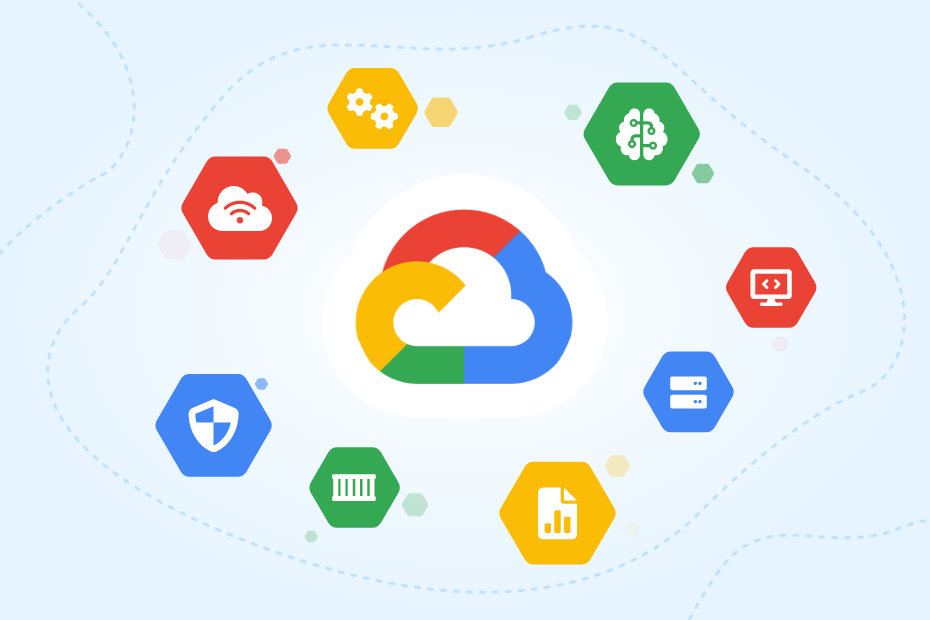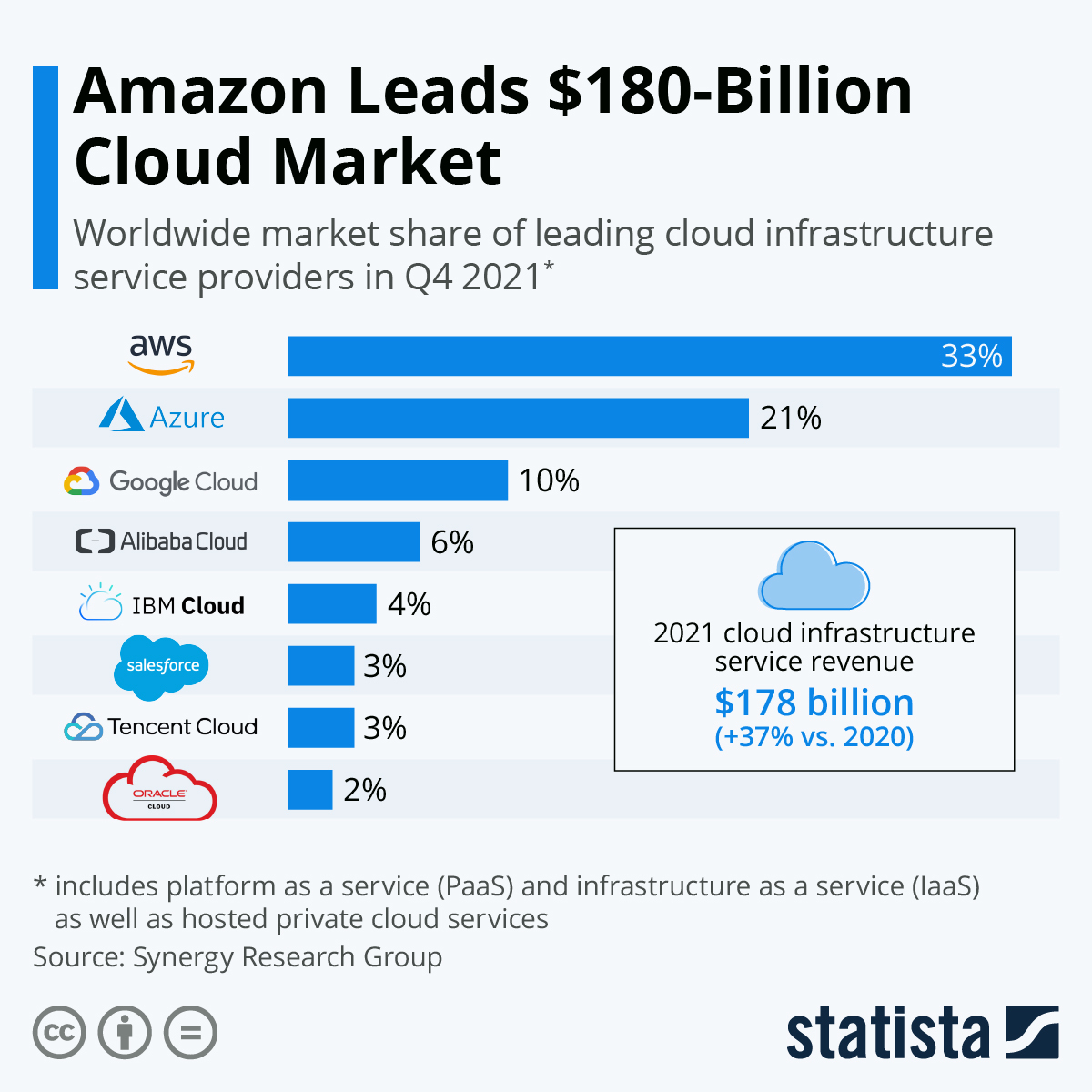
Every time you navigate with Google Maps, check your email with Gmail, create a spreadsheet using Google Sheets, or log in into your Chromebook, you’re accessing Google Cloud. Google Cloud is at the center of every Google service we use, including Google Workspace (formerly GSuite), Google Chrome OS Enterprise, and Google Cloud Platform, or GCP. GCP is a competitor to the renowned Amazon Web Services and enterprise-favorite Microsoft Azure, and provides a similar set of services.
This article outlines all the basics you need to know about Google Cloud Platform and where you can get certified with it.
Going by market share, GCP is the third largest cloud service provider after market leader AWS and Azure, as displayed in the following chart:

Source: Statista.
The difference between Google Cloud and Google Cloud Platform
Google Cloud Platform is a part of the larger Google Cloud, and provides public cloud infrastructure for hosting web-based applications. If you need compute instances, storage, or a managed database to host your web application, GCP can provide it. And if you need quick access to business applications from within a browser to enable seamless collaboration between your employees, Google Cloud also offers many additional services.
Google Cloud Platform services
In addition to basic compute, storage, and databases, GCP offers over 100 different cloud services under the following categories:
- Networking
- AI and machine learning
- Containers
- IoT
- Operations
- Security and identity
- Serverless
- API management
- Developer tools
- Data analytics
This means there is a service for every stage of application development, from writing code to deploying the application — even when you’re opting for a hybrid or multi-cloud environment.
GCP tools
Google Cloud Platform offers the following tools:
- Google App Engine
- Google Compute Engine
- Google Kubernetes Engine
App Engine is GCP’s platform-as-a-service (PaaS) platform. You can deploy your code and GCP will take care of the rest. App Engine adds and removes instances as the usage of the application increases and decreases.
Compute Engine is GCP’s infrastructure-as-a-service (IaaS) platform. It is similar to EC2 offered by AWS. You can use it to deploy highly customizable virtual machines. Deploying VMs on the cloud requires extensive configurations and customizations. Compute Engine gives you more control over your production environment while costing less than App Engine.
Google Kubernetes Engine (GKE) is a managed Kubernetes service offered by GCP. You can deploy, manage, and orchestrate containers to scale. Since Google created Kubernetes and has more expertise on the subject matter, GKE is preferred by enterprises over competing managed Kubernetes services.
Google Cloud Platform pricing
When opting for GCP, you have three payment models to choose from: you can pay as you go, pay in advance to save money, or go free. GCP is available as a free tier for more than twenty of its services, which is perfect for candidates preparing for one of the GCP certifications. Moreover, Google rewards $300 in credits to new users for testing GCP.
For its pricing, GCP bills for the amount of usage. Initial usage falls under the free tier and Google starts billing for any additional usage beyond the quota. Here are some of the criteria that GCP may bill you for:
Data storage
The bread and butter of every cloud provider. The more data you store on Google’s data center, the more they will charge you. However, there are substantial discounts on offer if your usage is above average. The first 5GB is free, while a 200 GB standard persistent disk volume will cost you $8.00 for the whole month.
Network usage
In response to requests, your compute instance will read or move volumes of data from one storage bucket to another. GCP will charge you for the volume and where exactly it is moving it under networking. Networking will be higher if the transfer is between two different GCP regions or zones.
GCP costs $0.01 - 0.08/GB and $0.08 - 0.15/ GB for egress traffic between two regions and two zones respectively. The cost is lower for the Europe and North America zones and may rise substantially in the Asia and Oceania zones. GCP doesn’t charge for ingress traffic.
Compute cost
A standard configuration with 8 vCPUs and 32GB memory will cost you around $200/month.
Google Cloud Platform certifications and training
If you are looking to build your application stack or entire infrastructure with GCP, you may need access to GCP certified developers and administrators. Google offers three levels of certifications to anyone wanting to build a career out of GCP: foundational, associate, and professional. Moreover, organizations may need access to GCP certified resources to cater to a subset of clients. Associate and professional certification requires six and twelve months of experience respectively to be eligible.
Training resources for GCP certification takes time, patience and money, although there are various free courses available on the internet to help you get started. For experienced professionals, GCP’s own training module is a great place to begin with.
1. Official GCP training program
The GCP training module is designed for professionals in the IT industry. The curriculum is pretty standard and Google’s documentation has ample examples to gain hands-on experience before sitting for the test. If you’re new to the field of IT then the course may look a little overwhelming, but Google has a dedicated training regime for newcomers although a more beginner friendly course is recommended. You can choose a learning path that suits your current understanding of the subject.
Access the course here.
2. Coursera’s Google Cloud Fundamentals
This is probably the best course for complete beginners and will provide candidates with the best starting point before moving to more advanced courses and certifications. Designed by the same people who built Google Cloud, the course assumes that you have no prior knowledge of cloud computing. The course is divided into various stages, and you have to clear the assessment test before moving to the next stage. It is free to enroll, although a completion certification will cost around $100.
Access the course here.
3. Udemy’s Complete Google Data Engineer and Cloud Architect Guide
There are probably dozens of Google Cloud courses on Udemy. This one stands out because the instructor is an ex-Google and Microsoft employee and has received very good ratings. The course starts with the basics of cloud computing such as compute, storage, and networking before moving to more advanced topics such as big data analytics and machine learning. Once you’re acquainted with a topic, the instructors will show you how to achieve it in Google Cloud. After discounts and offers, the course may cost you around $15 depending on where you live.
Access the course here.
4. Simplilearn’s Google Cloud Platform Architect Certification Training
For those comfortable with fundamentals of Google Cloud Platform (or any cloud platform, for that matter), this is an apt course if you’re preparing for Google Cloud Platform (GCP) Architect certification. While it fortifies your knowledge of GCP before going into exam-specific hands-on training, previous knowledge will accelerate the learning and make you able to confidently sit the certification examination earlier.
The curriculum covers almost every product and service in GCP’s portfolio. The course is targeted towards software developers, cloud solutions architects, systems operators, DevOps engineers or anybody who has experience in deploying and managing applications, either on-premises or in a public cloud environment in addition to GCP.
Access the course here.
Google Cloud Platform alternatives
In cloud computing, there are three major players: Amazon Web Services (AWS), Microsoft Azure, and Google Cloud. They offer a wide range of services, making them well-suited for businesses of all sizes.
Amazon Web Services (AWS)
AWS offers more storage options than Google Cloud, while Google Cloud offers more machine learning services. In terms of pricing, AWS is generally more expensive than Google Cloud. However, both providers offer free tier plans that can help businesses get started with cloud computing. Ultimately, the best provider for your business will depend on your specific needs and budget.
Read on: What Is AWS And Who Can Use It?
Microsoft Azure
Google Cloud offers a wide range of products and services, including big data, artificial intelligence, and serverless computing. Azure, on the other hand, focuses more on enterprise-grade services such as identity management and compliance.
If you're looking for a comprehensive cloud solution, Google Cloud is probably the way to go. However, if you need specific enterprise-grade services, Azure may be a better fit.
When seeking certified resources in Google Cloud, organizations have two choices: train their own resources, or hire an outside agency. While hiring your own resources has long-term benefits, training for certification takes time and most certifications have prerequisites. Therefore, it is wiser to hire someone outside the organization while your resources are receiving training.
At Rare Crew, you may choose from a slew of Google Cloud certified professionals and associates trained in multiple disciplines. Organizations choose Rare Crew for our expertise in the field of machine learning and big data analytics. Get in touch to find out what we can do for your business.
